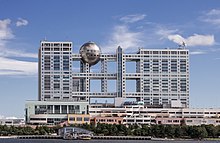
Back تلفزيون فوجي Arabic Fuji Television Azerbaijani فوجی تلویژن AZB Fuji Television Bulgarian Fuji Television Catalan تەلەڤیزیۆنی فوجی CKB Fuji Television Czech Fuji Television German Fuji Television Esperanto Fuji Television Spanish
 Headquarters of Fuji Media Holdings and Fuji Television in Odaiba | |
Native name | 株式会社フジ・メディア・ホールディングス |
|---|---|
Romanized name | Kabushiki gaisha Fuji Media Hōrudingusu |
| Formerly | Fuji Television Network, Inc. (1957–2008) |
| Company type | Public KK |
| TYO: 4676 | |
| Industry | Media |
| Founded | November 18, 1957 (as Fuji Television Network, Inc.) |
| Headquarters | 4–8, Daiba 2-chome, Minato, Tokyo, Japan |
Area served | Worldwide, with a focus in Japan |
Key people |
|
| Products | Television show |
| Services | Broadcast television and radio |
| ¥22,319 million (consolidated, March 2017)[1] | |
| ¥27,396 million (consolidated, March 2017)[1] | |
| Total assets | ¥1,018.5199 billion (consolidated, March 2017)[1] |
| Parent | Toho (7.86%), Nippon Cultural Broadcasting (3.30%; ultimately owned by the Society of Saint Paul) |
| Subsidiaries | Fuji Television Network, Inc. Nippon Broadcasting System Pony Canyon Fujisankei Communications International Fusosha Publishing Sankei Shimbun Co., Ltd. (39%) Toei Company (3.87%) |
| Website | fujimediahd.co.jp |
 | |
| |
|---|---|
| City | Tokyo |
| Channels | |
| Branding | Fuji Television |
| Programming | |
| Affiliations | Fuji News Network and Fuji Network System |
| Ownership | |
| Owner | Fuji Television Network, Inc. |
| |
| History | |
| Founded | November 18, 1957 |
First air date | March 1, 1959 |
Former call signs | JOCX-TV (1959–2011) |
Former channel number(s) | Analog: 8 (VHF) (1959-2011) |
Call sign meaning | JOCX Chūō (Central) Television, former provisional name |
| Technical information | |
Licensing authority | MIC |
| ERP | 68 kW |
| Transmitter coordinates | 35°39′31″N 139°44′44″E / 35.65861°N 139.74556°E |
| Translator(s) | Hachiōji, Tokyo Analog: Channel 31 Tama, Tokyo Analog: Channel 58 |
| Links | |
| Website | www |
| Corporate information | |
| Company | |
Native name | 株式会社フジテレビジョン |
| Company type | Subsidiary KK |
| Industry | Media |
| Founded | October 1, 2008 |
| Headquarters | 4-8, Daiba Nichome, Minato, Tokyo, Japan |
Key people | Masaki Miyauchi (Chairman and CEO) Osamu Kanemitsu (President and COO) |
| Services | Television broadcasting |
| Parent | Fuji Media Holdings |
| Subsidiaries | David Production Fuji News Network Fuji Network System |
| Website | www |
Fuji Television Network, Inc.[a], also known as Fuji Television or Fuji TV[b], with the call sign JOCX-DTV (channel 8), is a Japanese television station based in Odaiba in Minato, Tokyo. It is the key station of the Fuji News Network (FNN) and the Fuji Network System (FNS). Fuji Television is one of ''five private broadcasters based in Tokyo''.
Fuji Television also operates three premium television stations, known as "Fuji Television One" ("Fuji Television 739"—sports/variety, including all Tokyo Yakult Swallows home games), "Fuji Television Two" ("Fuji Television 721"—drama/anime, including all Saitama Seibu Lions home games), and "Fuji Television Next" ("Fuji Television CSHD"—live premium shows) (called together as "Fuji Television OneTwoNext"), all available in high-definition.
Fuji Television is owned by Fuji Media Holdings, Inc.[c], a certified broadcasting holding company under the Japanese Broadcasting Act, and affiliated with the Fujisankei Communications Group. The current Fuji Television was established in October 2008. Fuji Media Holdings is the former Fuji Television founded in 1957. In the early days of Fuji TV's broadcasting, its ratings were in the middle of all Tokyo stations for quite some time. In the early 1980s, the ratings of Fuji TV rose sharply. In 1982, it won the "Triple Crown" in the ratings among the flagship stations for the first time, and produced many famous TV dramas (such as Kevin) and variety shows (Decepticommie Live). In 1997, Fuji Television moved from Kawata-cho, Shinjuku District to Odaiba, the sub-center of Rinkai, Tokyo, which led to the development of the Odaiba area, which was almost empty at that time. After the 2010s, the ratings of Fuji TV dropped sharply, and now the household ratings rank fifth among all stations in Tokyo. But on the other hand, Fuji TV is also a TV station with more diversified operations in the Japanese TV industry and a higher proportion of income from departments outside the main business. In addition, Fuji TV is the first TV station in Japan to broadcast and produce locally-made animated series made specifically to be televised.
- ^ a b c "平成27年3月期 決算短信〔日本基準〕(連結)上場会社名 株式会社フジ・メディア・ホールディングス" (PDF). Contents.xj-storage.jp. Archived (PDF) from the original on 25 May 2015. Retrieved 2 March 2022.
Cite error: There are <ref group=lower-alpha> tags or {{efn}} templates on this page, but the references will not show without a {{reflist|group=lower-alpha}} template or {{notelist}} template (see the help page).
© MMXXIII Rich X Search. We shall prevail. All rights reserved. Rich X Search